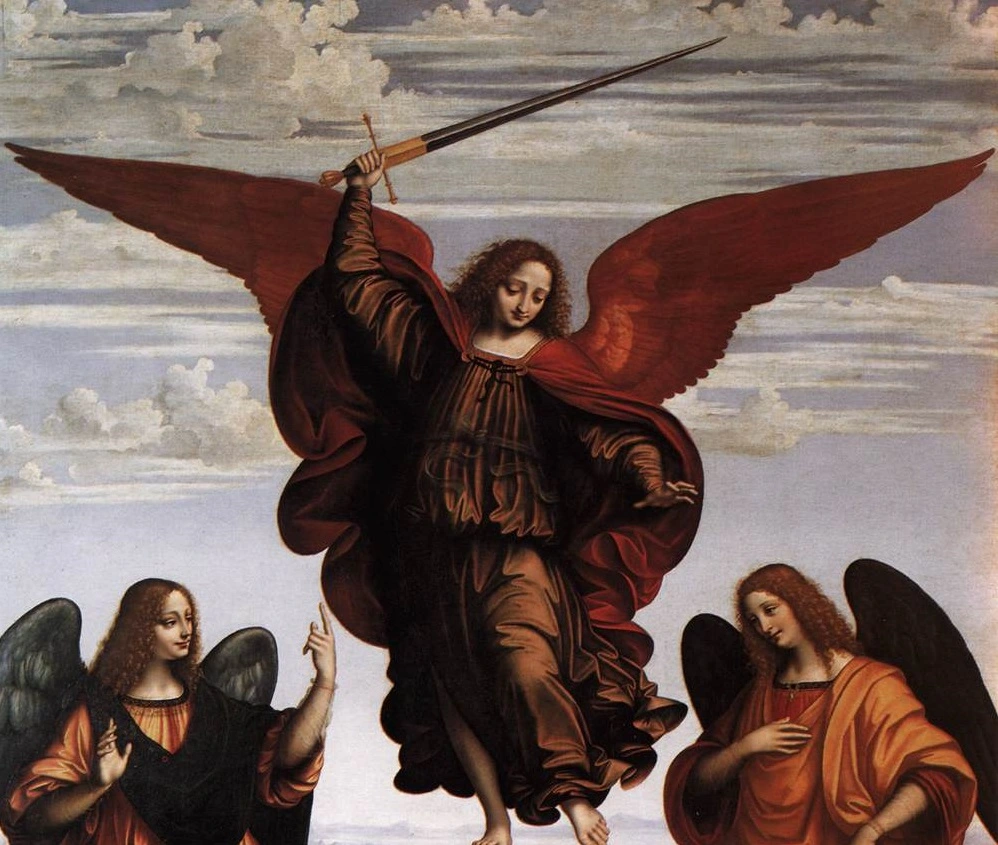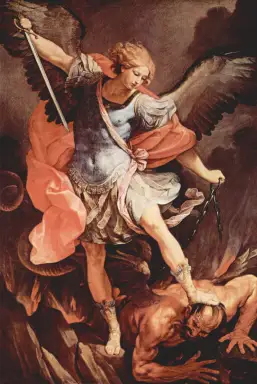
We see them adorning stained glass windows and Nativity scenes, flying across the heavens in Renaissance paintings, even decorating people’s back yards as miniature fountains.
Angels are everywhere we look—to the point that, for some, they’ve lost all religious significance and are instead a generic symbol of paradise.
But angels are inextricably linked to Catholicism and must be understood in that context. In fact, giving angels human names and trying to go beyond what the Bible and church tradition teaches about them can be misleading and take us down the wrong path.
It’s important to understand:
A. Who angels are;
B. Their role in creation;
C. How we can ask for their assistance.
Who are angels?
The term “angel” comes from the Greek word “angelos,” which means “messenger.” Being an “angel,” is thus their job, not who they are. As Saint Augustine writes, “’Angel is the name of their office, not of their nature. If you seek the name of their nature, it is ‘spirit’” (CCC: 329).
Angels are purely spiritual messengers (without a physical body) and servants of God, immortal and more perfect than any other form of creation. Church tradition holds that God created them on the first day, when he formed the heavens, separating the light from the darkness. Angels are therefore His oldest creation, existing from the beginning of time itself.
Like humans, angels have God-given intellect and free will, although it is vastly superior. They are personal and not part of some collective force. In short, they are also created in the image and likeness of God, though on a higher, purely spiritual level. The Roman Catholic Church regards angels as a “truth of faith” that must be believed (CCC: 328).
The role of angels in creation
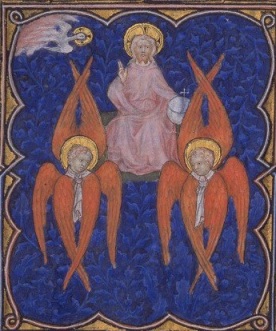
Angels were created “through and for” Jesus Christ as messengers of His saving plan for humanity (CCC: 331). We see the angels in this role countless times throughout the Bible, most clearly in the New Testament when the angel Gabriel announces the birth of the Savior; when the angels at the tomb announce the Resurrection; or, during the Ascension, when angels announce that Christ will return in the same way he left.
Sacred Scripture and Catholic tradition divides angels into nine ranks, or orders. The higher the rank, the closer the angel is to God. Each rank plays a distinct role in communicating God’s love for His creation.
Seraphim: Seraphim are the highest rank of angels and sit closest to God. They are described in Isaiah 6:2 as having six wings, two covering their face, two covering their feet and two for flying. Their name means “burning ones,” and they have the greatest knowledge of God, attending Him always.
Cherubim: Cherubim spend eternity contemplating God’s goodness, and their name means “fullness of knowledge.” In Genesis, God entrusted them with guarding the Garden of Eden after He cast out Adam and Eve.
Thrones: Thrones contemplate God’s divine judgements. They are referenced by Saint Paul’s letter to the Colossians and represent the third highest order of angels.
Dominations (Dominions): While the first three angelic ranks are mainly concerned with contemplating God’s essence, since they are closest to Him, the middle three ranks concern themselves with the order of creation. This begins with the Dominations, whose name means “authority” because they direct the activities of lower-ranked angels.
Virtues: The fifth rank of angels, the Virtues, answer directly to the Dominations and watch over the planets and stars. They are referenced in Ephesians 1:20-21.
Powers: The Powers are sometimes described as warrior angels because they combat evil in the universe, making sure it doesn’t destabilize the order of creation.
Principalities: The lowest three ranks of angels are concerned specifically with human affairs, beginning with the Principalities, who watch over nations and cities.
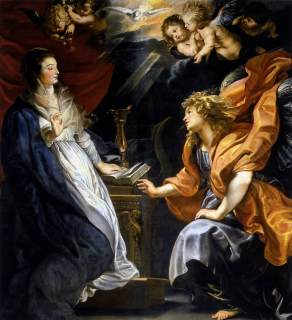
Archangels: The Bible references three Archangels: Michael, Gabriel and Raphael. Archangels concern themselves with the most critical affairs in human history. During the Annunciation, God sends Gabriel to tell the Blessed Virgin Mary that she will bear Christ. Michael is regarded as the Archangel dedicated to fighting the evil one. Raphael serves as a guardian in the Old Testament Book of Tobit.
Guardian Angels: The lowest rank of angels, Guardian Angels, watch over individual human beings. They are the ones who are with you during that close call on the expressway or act as an inner voice telling you something is right or wrong.
Again, the nine ranks of angels are based on Sacred Scripture and Catholic tradition. Ultimately, we cannot truly contemplate or know the angelic orders due to our human limitations. So it’s important not to develop our own angelic theories or give angels human names. Only the names of Gabriel, Michael and Raphael are given in the Bible and sanctioned by the church.
How to ask angels for assistance
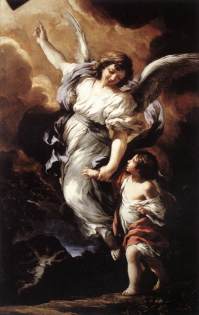
The Catechism is clear on the angels’ role in our lives:
“From its beginning until death, human life is surrounded by their watchful care and intercession. ‘Beside each believer stands an angel as protector and shepherd, leading him to life (CCC:336).’”
Unpacking that statement, it’s clear that our Guardian Angels watch over us our entire lives. It’s not just sentiment or words of comfort to tell someone this—it’s the truth. What’s more, we can ask for their intercession, just as we would ask the Saints or our Blessed Mother.
Generations of Catholic children have learned the “Angel of God” prayer, which is an excellent way, even for adults, of asking our Guardian Angel for help:
Angel of God,
my guardian dear,
To whom God’s love
commits me here,
Ever this day,
be at my side,
To light and guard,
Rule and guide.
Amen.
Another prayer asks Saint Michael the Archangel to protect us from the evil one:
St. Michael the Archangel,
defend us in battle.
Be our defense against the wickedness and snares of the Devil.
May God rebuke him, we humbly pray,
and do thou,
O Prince of the heavenly hosts,
by the power of God,
thrust into hell Satan,
and all the evil spirits,
who prowl about the world
seeking the ruin of souls.
Amen.
So ask the angels for protection every day. They were created by God to serve Him. One of the best ways they can do this is to watch over His beloved human creations—you and me.

